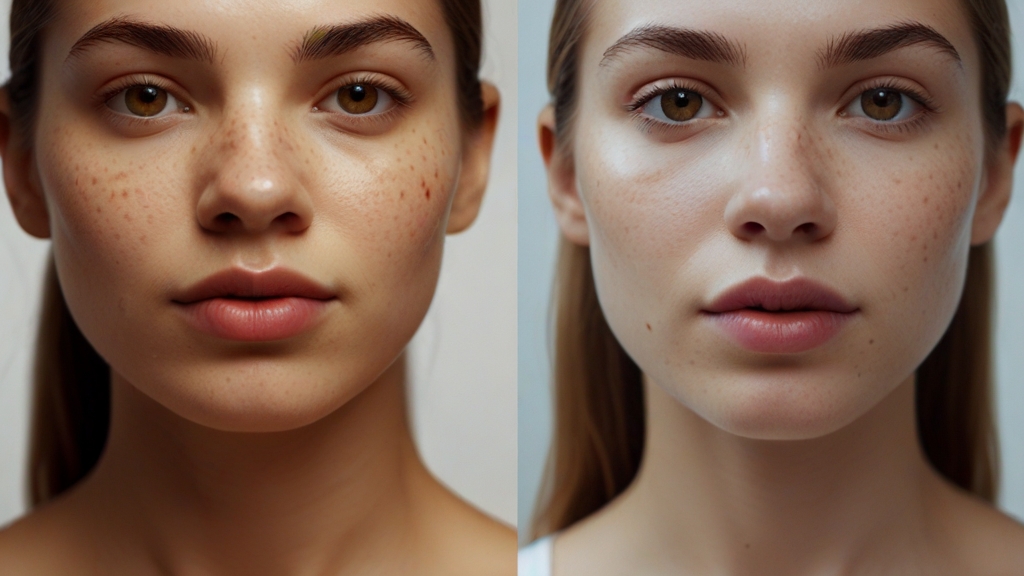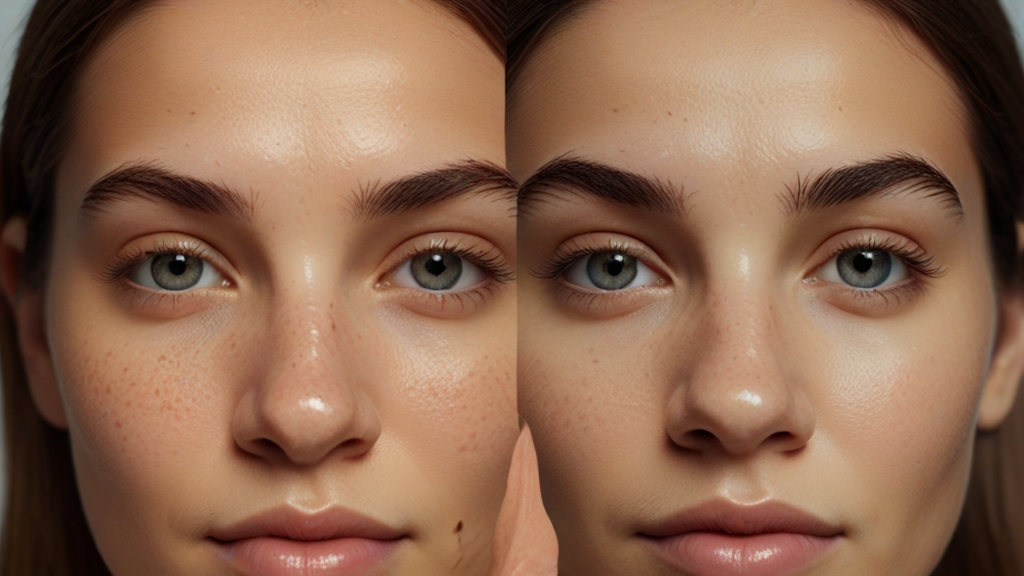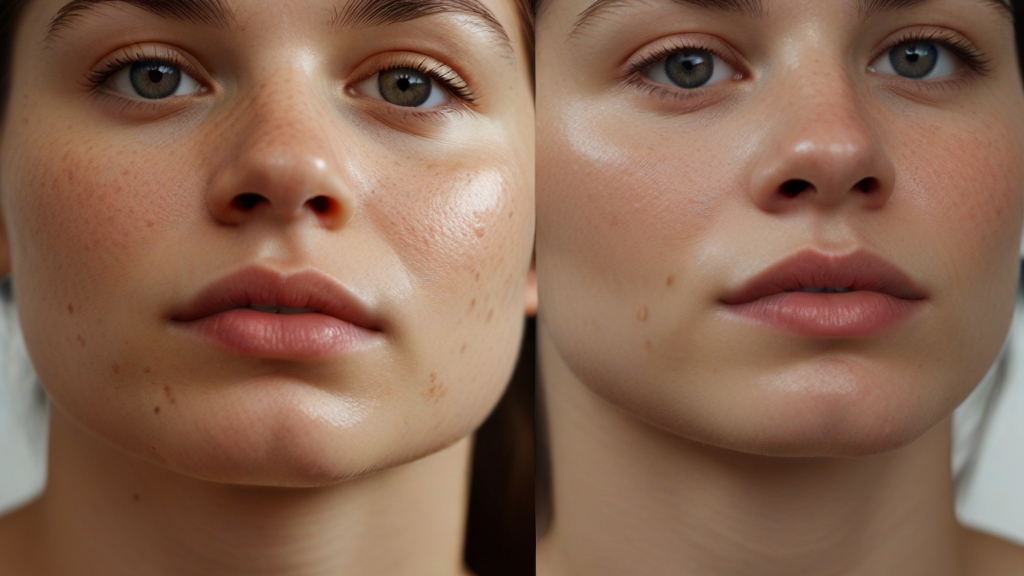
Amira Benhima
A passionate advocate for holistic wellness and natural beauty, is an accomplished author specializing in the benefits and uses of Argan oil, with years of experience exploring its wonders.
Key Takeaways
Have you ever wondered if argan oil could be the secret weapon to clear up your acne? Well, imagine a world where your skin is as smooth and clear as a calm lake on a summer’s day. Argan oil has been praised for its potential to improve acne before and after results, but does it really live up to the hype? In this discussion, we will explore the science behind argan oil’s acne-fighting power, its ability to reduce inflammation and prevent breakouts, and the real-life stories of individuals who have witnessed its impact on their skin. Get ready to discover the transformative effects of argan oil on acne-prone skin.
- Argan oil contains antioxidants and moisturizing properties that help reduce acne scars and promote skin cell healing.
- The oil’s anti-inflammatory properties soothe irritated skin, reducing redness and swelling.
- Argan oil unclogs pores, balances oil production, and prevents breakouts with its non-comedogenic and oil-regulating properties.
- The oil’s healing properties aid in fading acne scars, promoting skin cell regeneration, and preventing further scarring.
The Science Behind Argan Oil’s Acne-Fighting Power

Argan oil’s acne-fighting power stems from its unique combination of antioxidants, vitamins, and moisturizing properties, making it an effective treatment for acne. One of the key components of argan oil is Vitamin E, which plays a crucial role in reducing acne scars and promoting the healing of damaged skin cells. Vitamin E is known for its ability to promote skin cell regeneration, helping to fade acne scars and dark spots. This vitamin also helps to nourish and protect the skin, preventing further damage.
Additionally, argan oil is beneficial for those with oily skin. It helps regulate the skin’s hydrolipidic layer, which is responsible for balancing oil production. By maintaining this balance, argan oil prevents excess oiliness that can lead to clogged pores and acne breakouts. Furthermore, argan oil increases the turnover of old skin cells, promoting a healthier skin barrier. This reduces the likelihood of acne breakouts and helps to keep the skin clear and blemish-free.
Another advantage of argan oil for acne-prone skin is its moisturizing properties. Despite being an oil, argan oil is lightweight and easily absorbed by the skin. It helps to hydrate and nourish the skin, preventing dryness and maintaining overall skin health. When the skin is properly moisturized, it is less likely to produce excess oil, which can contribute to acne.
How Argan Oil Reduces Inflammation and Redness

To understand how argan oil reduces inflammation and redness associated with acne, it is important to explore its unique properties and their effects on the skin. Argan oil contains antioxidants and Vitamin E, which are known for their anti-inflammatory properties. These components work together to soothe irritated skin, calming redness and reducing swelling.
When you have acne-prone skin, inflammation and redness are common concerns. The anti-inflammatory properties of argan oil help to alleviate these issues. By applying argan oil to your skin, you can help soothe and calm the inflamed areas, reducing redness and promoting a clearer complexion.
Regular use of argan oil can lead to visible improvements in skin redness and inflammation caused by acne breakouts. The hydrating effects of argan oil also play a significant role in reducing redness. By balancing the skin’s moisture levels, argan oil helps to keep the skin hydrated and less prone to redness and irritation.
Many users have reported significant improvements in skin redness and inflammation after incorporating argan oil into their skincare routine for acne. The soothing and anti-inflammatory properties of argan oil make it an effective natural remedy for reducing redness and inflammation in acne-prone skin.
Argan Oil’s Ability to Unclog Pores and Prevent Breakouts

Using argan oil as part of your skincare routine can effectively unclog pores and prevent breakouts. Argan oil is non-comedogenic, meaning it won’t clog your pores, making it a suitable choice for those with acne-prone skin. Its anti-inflammatory properties help reduce redness and swelling associated with acne breakouts, promoting a clearer complexion. Additionally, argan oil’s high linoleic acid content can help balance oil production, preventing future breakouts. Regular use of argan oil can also promote skin regeneration, aiding in the healing of acne scars and blemishes.
To help you understand the benefits of argan oil in unclogging pores and preventing breakouts, let’s look at the following table:
| Benefits of Argan Oil for Acne-Prone Skin | How it Works |
|---|---|
| Non-comedogenic properties | Prevents clogging of pores, reducing the likelihood of breakouts |
| Anti-inflammatory effects | Reduces redness and swelling associated with acne breakouts |
| Balances oil production | Helps regulate sebum production, preventing excess oil that can lead to breakouts |
| Promotes skin regeneration | Aids in the healing of acne scars and blemishes, promoting clearer skin |
The Role of Argan Oil in Balancing Skin’s Natural Oil Production

By maintaining the skin’s natural oil balance, argan oil plays a crucial role in preventing clogged pores and breakouts. Here’s how organic argan oil helps balance your skin’s natural oil production:
- Regulates sebum production: Argan oil contains essential fatty acids that help regulate the skin’s sebum production. Sebum is the natural oil produced by your skin, and when it is overproduced, it can lead to clogged pores and acne breakouts. By providing the necessary fatty acids, argan oil helps control sebum production, reducing the chances of excess oil clogging your pores.
- Reduces excess sebum: One of the main causes of acne is excess sebum. When your skin produces too much oil, it can mix with dead skin cells and bacteria, leading to inflammation and breakouts. Argan oil helps prevent the skin from overproducing oil, leading to a reduction in excess sebum that can cause acne.
- Suitable for all skin types: Contrary to popular belief, argan oil is not just for dry skin. Its lightweight texture makes it suitable for all skin types, including oily skin prone to acne. It won’t clog your pores or leave your skin feeling greasy. Instead, it helps balance your skin’s oil production, keeping it hydrated without triggering excess oil production.
Incorporating organic argan oil into your skincare routine can help maintain a healthy oil balance in your skin. Whether you have dry, oily, or combination skin, argan oil provides the necessary nourishment to keep your skin hydrated without causing excess oil. Say goodbye to clogged pores and breakouts, and hello to a healthier complexion with the help of argan oil.
Argan Oil’s Antioxidant Properties for Healing Acne Scars

Argan oil’s antioxidant properties have been found to be beneficial for healing acne scars. By reducing inflammation and promoting skin cell regeneration, argan oil helps diminish the appearance of acne scars over time. The Vitamin E in argan oil aids in fading acne scars and dark spots, increasing the turnover of old skin cells and promoting a more even complexion.
Scar Healing Benefits
The antioxidant properties of argan oil contribute to the healing of acne scars by reducing inflammation and promoting the regeneration of skin cells. Here are three ways in which argan oil’s scar healing benefits are backed by evidence:
- Vitamin E: Argan oil contains a high concentration of Vitamin E, which aids in fading acne scars and dark spots by increasing the turnover of old skin cells. This helps to even out the skin tone and diminish the appearance of scars.
- Skin cell regeneration: The use of argan oil promotes the regeneration of skin cells, contributing to the overall improvement in the appearance of acne scars. It helps to stimulate the growth of new cells, which can gradually replace the damaged ones caused by acne.
- Hydrolipidic layer regulation: Argan oil helps regulate and balance the skin’s hydrolipidic layer, a protective barrier. This is essential for scar healing as it maintains the skin’s suppleness and moisture, preventing excess oil production that can lead to further scarring.
Acne Scar Reduction
To effectively reduce acne scars, harness the antioxidant properties of argan oil, which aid in healing damaged skin cells and reducing inflammation. Argan oil contains Vitamin E and other antioxidants that promote skin regeneration and improve the appearance of acne scars. These antioxidants work by neutralizing free radicals and protecting the skin from oxidative stress, which can hinder the healing process. By incorporating argan oil into your skincare routine, you can stimulate the turnover of old skin cells, fade acne scars, and even out skin tone. Additionally, argan oil helps regulate the skin’s hydrolipidic layer, promoting moisture and preventing excess oil production. With its healing properties and ability to promote new skin cell regeneration, argan oil is a valuable ingredient in reducing the appearance of acne scars and improving overall skin texture.
| Antioxidants | Vitamin E | Skin Regeneration |
|---|---|---|
| Neutralize free radicals | Promotes healing of damaged skin cells | Stimulates turnover of old skin cells |
| Reduces inflammation | Improves appearance of acne scars | Fades dark spots |
| Protects skin from oxidative stress | Regulates skin’s hydrolipidic layer | Promotes even skin tone |
| Promotes moisture and prevents excess oil production | Contributes to overall skin texture improvement | Beneficial ingredient in reducing acne scars |
Antioxidant Skin Repair
Harness the powerful antioxidant properties of argan oil to effectively repair damaged skin cells and reduce inflammation, promoting the healing of acne scars. Here’s how argan oil can help:
- Vitamin E: Argan oil is rich in Vitamin E, a potent antioxidant that helps protect the skin from free radicals and promotes skin regeneration. By applying argan oil to your acne scars, you can aid in fading them over time and achieve a more even skin tone.
- Antioxidant properties: The antioxidants in argan oil combat oxidative stress and inflammation in the skin, which are common factors in the development of acne scars. Regular use of argan oil can help reduce redness, swelling, and inflammation, allowing your skin to heal more effectively.
- Skin regeneration: Argan oil supports the growth of new skin cells, helping to improve the texture and appearance of acne scars. Its nourishing properties contribute to the overall health of your skin, making it more resilient and less prone to scarring.
How Argan Oil Soothes and Calms Irritated Skin

With its anti-inflammatory properties, argan oil effectively soothes and calms irritated skin, providing relief from redness and discomfort caused by acne breakouts and skin irritation. This natural oil contains compounds that help reduce inflammation, making it an ideal choice for those with acne-prone skin. When applied topically, argan oil penetrates deep into the skin, delivering its soothing and calming effects directly to the affected areas.
One of the main benefits of argan oil is its ability to reduce redness. The anti-inflammatory properties of argan oil help to calm the skin, reducing the appearance of redness and inflammation caused by acne breakouts. This can provide instant relief and help to improve the overall appearance of your complexion.
In addition to reducing redness, argan oil also helps to alleviate discomfort associated with acne breakouts and skin irritation. It helps to moisturize the skin and restore its natural balance, which can alleviate dryness and discomfort. The nourishing properties of argan oil also promote skin healing and regeneration, helping to repair the skin barrier and prevent future breakouts.
Regular use of argan oil can contribute to a calmer, more balanced complexion, especially for acne-prone skin. By soothing and calming irritated skin, argan oil helps to create a healthier environment for your skin to thrive. Its hydrating effects also help to maintain optimal moisture levels, preventing dryness and promoting a smoother, more supple complexion.
Real-Life Before and After Stories: Argan Oil’s Impact on Acne

If you’re curious about the real-life impact of argan oil on acne, you’ll be pleased to hear that many individuals have experienced a clear skin transformation. Testimonies from users reveal a noticeable improvement in their acne condition after incorporating argan oil into their skincare routine. Before and after photos further demonstrate the visible effects of argan oil on acne-prone skin, making it a promising option for those seeking a solution to their acne concerns.
Clear Skin Transformation
Users who have incorporated argan oil into their skincare routine have experienced a significant reduction in acne breakouts, leading to a clear skin transformation. Here are three ways in which argan oil has helped individuals achieve clearer skin:
- Improved Skin Texture and Clarity: Before and after photos have showcased a noticeable improvement in skin texture and clarity, with acne scars fading over time. The nourishing properties of argan oil promote skin regeneration and repair, resulting in a smoother and more even complexion.
- Decreased Inflammation and Redness: Individuals have reported a decrease in inflammation and redness associated with active acne lesions. Argan oil contains anti-inflammatory compounds that soothe and calm irritated skin, reducing the appearance of red, swollen pimples.
- Balanced Oil Production: Argan oil helps balance oil production, leading to fewer clogged pores and breakouts. By moisturizing the skin without clogging the pores, argan oil helps regulate sebum production, preventing excess oiliness and the formation of acne-causing bacteria.
Incorporating argan oil into your skincare routine can contribute to a clear skin transformation by improving texture, reducing inflammation, and balancing oil production.
Acne Improvement Testimonies
Acne sufferers have shared their real-life before and after stories, highlighting the transformative impact of argan oil on their skin. Incorporating argan oil into their skincare routine has led to significant improvements in their acne. Users have reported a reduction in acne breakouts, with visible improvement in acne scars and dark spots. Consistent use of argan oil has also helped decrease inflammation and redness associated with acne-prone skin. By regulating oil production, argan oil has contributed to fewer breakouts and a clearer complexion. Furthermore, the healing properties of argan oil have resulted in smoother, more hydrated skin and minimized acne scarring. These testimonies provide real-life evidence of the positive effects of argan oil on acne improvement.
| Testimony 1 | Testimony 2 | Testimony 3 |
|---|---|---|
| “Argan oil has been a game-changer for my acne. My breakouts have significantly reduced, and my skin looks much clearer.” | “I used to struggle with acne scars and dark spots, but after incorporating argan oil into my routine, I’ve seen a visible improvement in their appearance.” | “The inflammation and redness on my acne-prone skin have noticeably decreased since I started using argan oil. It has truly transformed my complexion.” |
Frequently Asked Questions
Does Argan Oil Get Rid of Acne?
Yes, argan oil can help get rid of acne. Compared to other acne treatments, argan oil’s anti-inflammatory and healing properties make it effective in reducing acne breakouts. The best way to use argan oil for acne is to apply a few drops to clean, dry skin as a moisturizer or spot treatment. When choosing argan oil for acne-prone skin, look for organic, cold-pressed, and non-comedogenic options. Remember, consistency is key in seeing the best results.
How Long Does It Take to See Results From Argan Oil?
When using argan oil for acne, you may start to see results at different speeds. The effectiveness of argan oil on your acne depends on factors like your skin type, the severity of your acne, and your overall skincare routine. It’s important to be consistent with your application of argan oil to see the best results. By following best practices, such as applying it daily and giving it time to absorb into the skin, you can increase the likelihood of seeing improvements in your acne over time.
What Is the Disadvantage of Argan Oil on Face?
The disadvantage of using argan oil on your face is the potential for side effects and risks. While argan oil is touted for its many benefits, it may not be suitable for everyone. Some individuals may experience breakouts, clogged pores, and skin irritation due to its comedogenic properties. Additionally, those with sensitive skin may have allergic reactions to argan oil. It’s important to patch test before full application and use it sparingly to prevent these disadvantages.
Should I Leave Argan Oil on My Face Overnight?
Leaving argan oil on your face overnight can be beneficial for your skin. It provides deep hydration and nourishment, promoting skin repair and regeneration while you sleep. However, it’s important to consider potential side effects and individual preferences. Some people may prefer to use it as a daytime moisturizer instead. To use argan oil overnight, apply a thin layer to clean skin before bedtime for the best results. It’s always a good idea to test it on a small area first to ensure compatibility with your skin.
Related Articles
Topical Argan Oil Application for Acne
Get ready to discover the golden secret to banishing acne with topical Argan oil that will leave you wanting more.
Vegan Argan Oil Skin Moisturizer Brands
Looking for a vegan argan oil skin moisturizer brand that will leave your skin feeling nourished and hydrated? Find out which top brand starts with the letter 'F'!
Blending Argan Oil With Other Acne Remedies
Knead your way to clearer skin as we explore the powerful combination of argan oil and other acne remedies, revealing the secrets to a healthier complexion.


